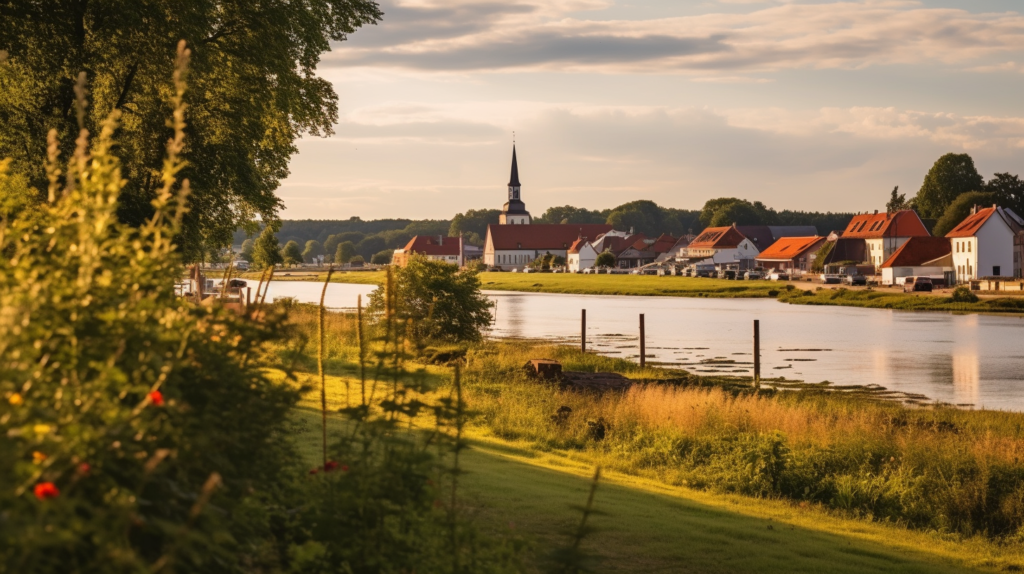
AI image by Midjourney
If you want to work or study in Germany, you may wonder about one question: Is Germany good for migration? Are many migrants living in Germany? How do Germans feel about immigrants? We provide the answers.
The facts
It is a bit challenging to answer the question “Is Germany good for migration?”. There are many aspects to consider, but we try our best to provide you with a quick and detailed article.
Let’s start with the facts: Currently, there are about 83 million people living in Germany. Around 12 million of them are foreigners, i.e. people without German citizenship. More than 22 million in Germany have a migration background. Over the past ten years, the proportion of foreigners in Germany has continued to rise.
All experts expect the proportion of foreigners in Germany to continue to rise in the future. There are several reasons for this:
Of the approximately 12 million internationals in Germany, about two-fifths have EU citizenship. Most common among EU foreigners in Germany are:
- Poles (just under 900,000 people)
- Romanians (just under 800,000 people)
- Italians (about 650,000 people).
The largest international group in Germany is the nearly 1.5 million Turks. The group of Syrians is also large (over 800,000 people). There are also many people in Germany from the former Yugoslavia and from Russia, Ukraine and Kazakhstan.
About 20 percent of the internationals in Germany come from Asia. Vietnam, China, India, Syria, Afghanistan, Iran and Iraq are significant countries here. By contrast, very few internationals in Germany come from Africa: just about five percent.
Feelings: Is Germany good for migration?
But how does it feel to be an international in Germany? Of course, there are many different experiences. On the one hand, there are foreigners in Germany who feel very much at home. In cities like Berlin, Munich or Hamburg, many people from abroad work in very well-paid jobs, for example at international companies, in a start-up or or as freelancers. Many of these people will tell you that it is easy to live in Germany and that they also feel comfortable as foreigners.
In industrial cities such as Braunschweig, Wolfsburg, Duisburg or Essen, there are also many very satisfied foreigners – these often work in medium-sized companies, work as employees or civil servants for the German state or are self-employed.
Many immigrants like about Germany in particular:
- the high level of public safety
- the excellent health care system
- easy opportunities to start a business in Germany
- very good opportunities for advancement through education, even for adults
- the high income
- the very good infrastructure (roads, public transportation)
- the clean environment
- the varied landscape.

What do Germans think about internationals?
On the other hand, some immigrants in Germany say that there is a strong culture of distance and aloofness here. Some believe that about a third of Germans are very hospitable and have no objections at all to foreign immigrants. Often these are people who have already been abroad themselves, come from abroad or have a higher education.
About another third of Germans are neutral toward foreigners in Germany. Finally, the remaining third is against immigration from abroad. Some of these people only object to immigration from certain countries or cultural groups, while others are actually xenophobic or racist. People in this third also make it quite clear that they would rather have nothing to do with internationals.
Actual actions towards internationals, open and aggressive rhetoric or violent acts do of course exist in Germany. Both by Germans towards foreigners and by foreigners towards foreigners. One should not gloss over anything here. But after almost 20 years of living abroad, I believe that the hostility towards internationals in Germany is not much different or higher than in France, Lithuania, Poland or Spain.
If an unpleasant or illegal situation should ever happen to you as an international in Germany, you too have the right to turn to the police and the judiciary. There are even special contact persons who will help you to enforce your rights.
Life-in-Germany.de is an independent online journal from Germany, informing about career opportunities since 2018. We provide tips on apprenticeships, dual studies, studies, jobs and applications. We help companies with recruitment advice and in connecting international partners for career placements in Germany. We are looking forward to your cooperation requests.
Where do internationals live in Germany?
Within Germany, most of the internationals live in the federal states of North Rhine-Westphalia, Bavaria and Baden-Württemberg since these are the largest states in Germany. Many foreigners live in the major cities of Cologne, Berlin, Stuttgart, Hamburg, Munich, Dortmund and Hanover.
Basically, most of the foreigners in Germany live in the cities. The more rural and the smaller the place in Germany, the less foreigners there are.

This is due to the following reasons:
- In the cities there are usually more jobs, study places and apprenticeships than in the countryside.
- It is easier for internationals to find housing in cities.
- There are often more care facilities for migrants in cities (social centers, special kindergartens, counseling centers).
- Many migrants feel more comfortable in cities because there are already many foreigners here.
If you move to a small town in Germany – especially in eastern Germany – you may be the only international here. At a train station in a big city, on the other hand, you may see more migrants than Germans.
What is the future like for migrants in Germany?
It is of course very difficult to say how Germany and the world will develop in the coming years and decades. However, we are very optimistic that Germany will become a country of immigration in the future, similar to the USA.
This means, above all, immigration according to specific control over the number and qualifications of immigrants. So far, mainly highly qualified people have been invited to Germany (Blue Card). We believe that in the future, lower-skilled people will also be invited to Germany to a greater extent. Germany simply needs more workers and more children as offspring.
We also believe that Germans will become even more accustomed to foreign fellow citizens. All in all, we believe that it is now worthwhile for many internationals to
- to learn the German language
- acquire educational qualifications abroad
- to find out about new job opportunities and study possibilities in Germany.
Questions and answers
-
What are the main reasons people migrate to Germany?
People migrate to Germany for various reasons, including job opportunities, higher education, family reunification, and improved quality of life. Germany’s strong economy, world-class universities, and social benefits attract migrants from around the world.
-
What is the German language requirement for migrating to Germany?
The language requirement depends on the type of visa you’re applying for. Generally, a basic knowledge of German (A1 level) is required for family reunification visas, while some work visas may require a higher level (B1 or B2). For student visas, proficiency in either German or English, depending on the language of your study program, is needed.
-
How can I find a job in Germany before migrating?
To find a job in Germany before migrating, you can use online job portals, such as Indeed or StepStone, register with German job agencies, or attend job fairs in your country. Networking through professional platforms like LinkedIn and XING can also help you find job opportunities.
-
What is the process of getting a residence permit in Germany?
After arriving in Germany with a valid visa, you need to register your address at the local Resident Registration Office (Einwohnermeldeamt) and apply for a residence permit at the Foreigners’ Office (Ausländerbehörde). You’ll need to provide proof of your visa, passport, address registration, and other required documents, along with paying the application fee.
-
Can I bring my family to Germany if I’m a skilled worker?
Yes, skilled workers with a valid German work visa or Blue Card can apply for a family reunification visa to bring their spouse and dependent children to Germany. The family members need to meet certain requirements, such as basic German language skills and proof of adequate living space and financial means.
-
Is health insurance mandatory for migrants in Germany?
Yes, health insurance is mandatory for all residents in Germany, including migrants. You can choose between public (gesetzliche Krankenkassen) and private (private Krankenversicherung) health insurance providers, depending on your eligibility and preferences.
-
How can I apply for permanent residency in Germany?
To apply for permanent residency (Niederlassungserlaubnis) in Germany, you must meet certain requirements, such as holding a temporary residence permit for at least five years, demonstrating sufficient German language skills (B1 level), having a stable income, and contributing to the German social security system.
-
Can I work in Germany while studying at a university?
Yes, international students can work part-time while studying in Germany. However, there are restrictions on the number of hours worked per year. Students from EU/EEA countries have no work-hour limitations, while non-EU students can work up to 120 full days or 240 half days per year without a work permit.
-
What is the recognition of foreign qualifications in Germany?
The recognition of foreign qualifications in Germany depends on the profession and the country where the degree was obtained. For regulated professions, such as doctors or lawyers, a formal recognition process is mandatory. For non-regulated professions, it is advisable to obtain an evaluation of your qualifications from the Central Office for Foreign Education (ZAB) or a relevant professional chamber.
-
How can I find affordable housing in Germany as a migrant?
To find affordable housing in Germany, consider checking online platforms like ImmobilienScout24, WG-Gesucht, or eBay Kleinanzeigen. You can also search for local newspapers or join social media groups focused on housing in your desired city. For students, applying for a room in a student dormitory is another affordable option.
-
What is the cost of living in Germany for migrants?
The cost of living in Germany varies depending on the city and your lifestyle. On average, a single person can expect to spend around €850 to €1,200 per month for living expenses, including rent, groceries, transportation, and leisure activities. Larger cities, like Munich or Frankfurt, generally have higher living costs than smaller towns.
-
Can I apply for a German visa if I have a criminal record?
It depends on the nature and severity of the crime. Having a criminal record may negatively impact your visa application, as German authorities may consider you a threat to public safety. In some cases, minor offenses may not affect your application, but it’s essential to disclose your criminal record during the application process.
-
Can I change my visa type after arriving in Germany?
It is possible to change your visa type after arriving in Germany, but it depends on your circumstances and the type of visa you hold. You’ll need to apply for a new visa at the Foreigners’ Office (Ausländerbehörde) and provide supporting documentation to demonstrate your eligibility for the new visa type.
Regional Variations in Job Demand for Migrants in Germany
Germany’s regions offer distinct job opportunities for migrants, shaped by local industries, educational institutions, and the socio-economic focus of each federal state. Understanding these regional dynamics is essential for migrants, as career prospects and work conditions can differ markedly from one area to another.
In states like North Rhine-Westphalia (NRW) and Baden-Württemberg, manufacturing, automotive, and engineering sectors are thriving. Cities such as Stuttgart (Baden-Württemberg) and Düsseldorf (NRW) host a strong industrial base, often creating demand for engineers, skilled tradespeople, and technicians. Migrants with backgrounds in mechanical and electrical engineering, logistics, or skilled trades find ample job opportunities, often with companies that actively seek international expertise due to a scarcity of local workers. These regions also benefit from structured apprenticeship programs and dual training models that offer migrants pathways to in-demand roles within these industries.
Meanwhile, Berlin and Munich represent tech and service sector hubs, drawing a significant number of IT specialists, software engineers, and marketing professionals. Berlin, in particular, is renowned for its startup ecosystem, attracting young migrants and graduates seeking roles in tech and creative industries. Many companies here are English-friendly, creating a somewhat easier environment for those who may not be fluent in German but are skilled in tech, media, or creative fields. Munich, with its well-established tech companies like Siemens and BMW, offers opportunities primarily for highly skilled tech professionals and those with advanced German language skills.
Smaller cities and rural regions, especially in eastern Germany (e.g., Saxony, Thuringia), also experience a strong need for workers, particularly in healthcare and elder care. These regions offer different lifestyle benefits, such as lower living costs and a quieter pace of life, which can appeal to some migrants. However, they may also present challenges, such as fewer expat communities and less infrastructure for language support and integration. Migrants looking at opportunities in these areas can benefit from government-backed relocation assistance or integration programs tailored to help newcomers settle and adapt.
Trends in International Student Migration and Workforce Integration
Germany has become a top destination for international students, particularly in fields such as engineering, IT, and healthcare, due to its high-quality education system and career prospects. In recent years, the government has developed programs specifically to retain these students after graduation, as they are seen as a solution to fill the country’s skilled labor gaps. The STEM (Science, Technology, Engineering, and Mathematics) and healthcare sectors are particularly advantageous for foreign students, as they offer both job security and paths toward permanent residency.

International graduates from German universities often benefit from the country’s 18-month post-study work visa, which allows them to seek employment within their field. This period has been particularly helpful for graduates in tech and engineering, where demand is high and positions are more likely to align with student expertise. The Blue Card program, designed for highly qualified non-EU citizens, has also proven effective for students who meet salary and qualification requirements. Notably, graduates from fields like IT or certain types of engineering often find jobs faster and with fewer language requirements than other sectors, though learning German remains a strong asset.
University-industry collaborations further enhance integration by connecting students with job opportunities through internships, research projects, and corporate partnerships. Institutions like Technical University of Munich and RWTH Aachen University exemplify this, as they have deep-rooted partnerships with tech and industrial firms in Germany. Students who engage in these programs gain not only practical experience but also increase their chances of securing long-term employment, particularly in regions where companies look to invest in next-generation tech talent.
Small-Town versus Metropolitan Experiences for Migrants in Germany
Migrants in Germany encounter distinct differences in lifestyle, work environments, and integration opportunities based on whether they settle in a major city or a smaller town. Large cities such as Berlin, Munich, and Frankfurt offer vibrant, diverse communities and numerous amenities that can ease the transition into German life. These urban centers provide a wide range of professional opportunities, especially in sectors like tech, finance, and media, which attract international talent and often support English-speaking workplaces. Urban areas also offer more extensive expatriate communities, international schools, and cultural resources, all of which help migrants acclimate to life in Germany.
For many, the experience of living in a German metropolis aligns well with international work cultures, as larger companies tend to have multilingual staff, support for career mobility, and flexible working conditions. Furthermore, metropolitan centers provide access to essential services like integration courses, networking events, and international associations. However, the competition for housing and the high cost of living in these cities can be challenging, especially for new arrivals or those with lower incomes. In places like Berlin and Munich, housing shortages have become a pressing issue, with long waiting times for affordable apartments and rising rents. As a result, some migrants consider alternatives outside major cities.

Smaller towns and rural regions, such as those in Saxony or Bavaria, provide their own unique advantages, though they can present challenges for newcomers. Jobs in healthcare, manufacturing, and agriculture are often more plentiful in these areas, and industries facing local labor shortages may offer added support to attract skilled foreign workers. Smaller towns generally have lower living costs and reduced competition for housing, making them appealing for families and those seeking stability. Additionally, certain states have introduced localized integration support, which can help migrants build connections with the local community through mentorship programs, language courses, and social gatherings.
On the other hand, migrants in rural areas may find fewer expat communities and less familiarity with English, making it necessary to learn German quickly to navigate daily life. Small towns may offer fewer social and cultural outlets, which can be isolating for some; however, those interested in a more traditional German experience often appreciate the slower pace of life, family-friendly environment, and close-knit community atmosphere. For migrants working in essential services, especially healthcare, the demand in these areas is often strong enough to allow for easier entry into the workforce.
Keyword search: Family, migration


